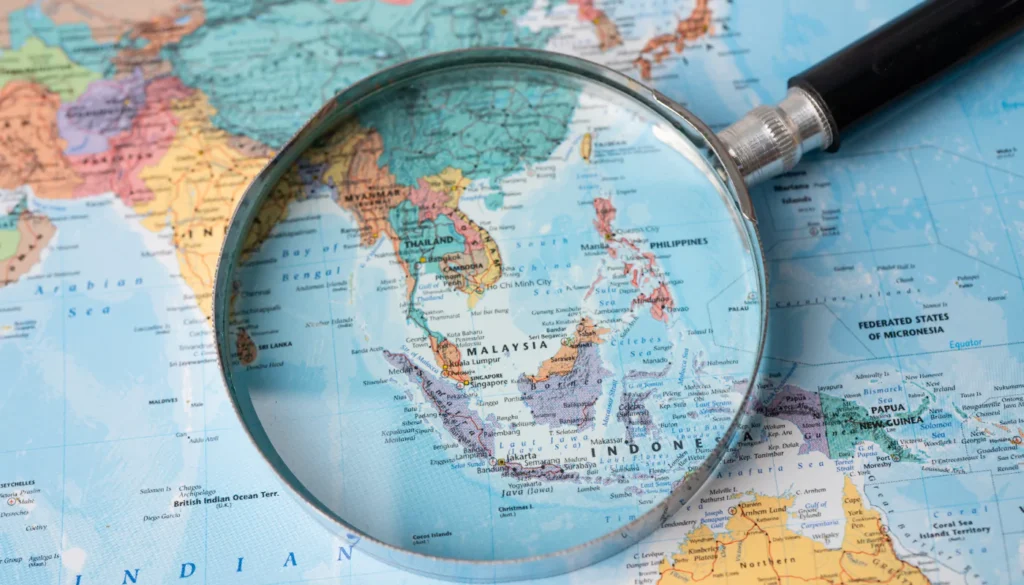Moving to Asia can be tricky for expats. One big challenge is building good work relationships with locals. This post will give tips and insights for success as a monger in Asia. Keep reading to learn more!
Key Takeaways
- Monger culture in Asia is about experiencing new places and connecting with people. Sex tourism affects the local view of tourists.
- Understanding and adapting to different cultures and customs is important for expats in Asia.
- Building good work relationships with locals helps your success as an expat.
- Research, money management, safety, and a balance between work and personal life are key tips for living well in Asia.
- Experiences vary across regions like Central Asia, East Asia, Southeast Asia, South Asia, North Asia, and West Asia. Each place has its unique challenges and benefits for expats.
Understanding Monger Culture in Asia

Monger culture in Asia is diverse and complex. Many people travel to experience new places and connect with locals, which shapes the scene in different ways.
Prevalence of sex tourism and its impact
Sex tourism is common in many parts of Asia. It affects local cultures and economies. Some people travel to find pleasure, while others face challenges. Expats living abroad may see this as a part of the lifestyle.
It can lead to mixed feelings among locals and foreigners alike.
This trend has an impact on how countries view tourists. Some places try to promote safe practices for workers and visitors. Expat life in Asia can be influenced by these cultural dynamics.
Understanding sex tourism may help expats adapt better to their new surroundings.
Next, let’s explore the mongering experience across different regions in Asia.
Age and demographics of Mongers
Mongers in Asia come from various age groups. Many are middle-aged men, often looking for adventure or new experiences. Younger travelers also join this scene, seeking excitement and connection.
The demographics vary by region. In some places, older expats dominate the landscape. In others, younger tourists may be more common.
Understanding these trends can help newcomers fit in better. Age influences how people interact and form relationships. Older Mongers might prefer quieter spots while young travelers seek lively scenes.
Cultural adaptation is key for success as an expat monger in Asia. Being aware of these differences helps create enjoyable interactions and connections with locals and fellow travelers alike.
The Mongering Experience in Different Regions of Asia

The mongering scene varies across Asia. Each region offers its own vibe and culture for expats to explore.
Central Asia
Central Asia has a unique expat scene. Living as an expat in Central Asia can be different from other regions. The culture and lifestyle vary greatly here. Expats find that building effective working relationships with local colleagues is key for success.
Cultural adaptation plays a big role.
Finding opportunities may take time, but it is rewarding. Expat experiences often lead to personal growth too. Time spent in this region can enhance skills and boost careers long-term.
Understanding local customs helps make life easier for foreigners in Asia.
East Asia
East Asia offers a mix of cultures and lifestyles. Expats face unique challenges, like building effective working relationships with local colleagues. This can be tough for Europeans who may struggle to connect.
Yet, the time spent working in this region can boost personal growth. Living abroad in Asia enhances skills that employers value later.
In East Asia, cultural understanding is key. Each country has its customs and ways of life. Success as an expat often means adapting to these differences. Engaging with locals helps build connections and create lasting experiences in your new home.
Next, we will explore North Asia and what it has to offer expats.
North Asia
North Asia offers a unique expat experience. Countries like Mongolia and parts of Russia have rich cultures. Expat life here can be challenging but rewarding. Cultural adaptation is key for success as an expat in North Asia.
Building good relationships with local colleagues is crucial for work.
Many expats miss their families while living abroad in this region. However, the time spent working in North Asia can enhance personal growth. This makes individuals more valuable employees over time.
Understanding local customs helps create a smooth transition into the community and workplace culture.
South Asia
South Asia has a unique expat experience. Living in countries like India, Pakistan, and Bangladesh can be rewarding yet challenging. Expats often miss their families. This feeling is one of the biggest challenges for them.
Building strong working relationships with local colleagues is key to success. It helps create a good work environment.
Cultural adaptation is vital in this region. Understanding local customs and traditions can make life easier for foreigners in Asia. Time spent working or studying here boosts personal development too.
Employers value Asian work experience highly in the long run. Expat life offers rich cultural insights and international experiences that shape an expatriate lifestyle in South Asia.
Southeast Asia
Southeast Asia is a unique place for expats. The experience can vary greatly between countries. Many foreigners find it exciting yet challenging to live and work here. Expats face issues like missing family back home.
Cultural differences also play a big role in daily life.
Building effective working relationships with local colleagues is key to success in this region. It’s important to adapt well to the local way of life for fulfillment as an expat. Time spent working or studying in Asia helps personal growth too, making individuals more valuable employees later on.
Understanding these factors will enhance your experience as an expat monger in Southeast Asia and help you gain insights into the broader challenges and benefits of being an expatriate across the continent.
West Asia
West Asia offers a unique experience for expats. The culture and lifestyle vary greatly across countries in this region. Many people face challenges when building relationships with local colleagues.
Effective work ties are key to success as an expat in West Asia. Missing family can be tough, too.
Living abroad in West Asia can aid personal growth. Time spent here helps make individuals valuable employees over time. Expats should consider factors like religion and the cost of living before moving to this area.
Understanding local customs boosts cultural adaptation for expats working in West Asia.
Challenges and Benefits of Being an Expat Monger
Being an expat monger comes with ups and downs. You will learn about new cultures while also facing challenges like finding the right balance in life.
Cultural adaptation and understanding
Cultural adaptation is vital for expats living in Asia. Each country has its own customs and traditions. Understanding these helps build better relationships with local colleagues.
Europeans often struggle to connect at work due to these cultural differences. Missing family also adds stress, as it can be hard to feel at home abroad.
Adapting means learning about the people and their ways of life. Expats who take time to understand their host culture find greater success in Asia. Work experience from this region is valuable over time.
It enhances personal growth and makes individuals more appealing as employees later on.
Work and lifestyle challenges
Living and working as an expat in Asia brings its own set of challenges. Europeans often struggle to build strong working relationships with local colleagues. This can make daily tasks harder.
Missing family is another big issue for many expats living abroad. It can lead to feelings of loneliness or homesickness.
Understanding local culture is key for finding success in Asia. Expatriate life may feel overwhelming at times, especially when adapting to different customs and ways of doing business.
These lifestyle changes require patience and effort but can also lead to unique experiences and personal growth over time.
Unique experiences and insights
Moving from work and lifestyle challenges, unique experiences await expats in Asia. Many find that time spent working or studying in Asia helps personal growth. This can make them more valuable employees later on.
Living as an expat in Asia offers chances to learn about different cultures. Each country has its own way of life, which adds richness to daily experiences. Expatriates often share their stories about adapting to local customs and meeting new people.
These insights contribute greatly to the overall expatriate lifestyle in Asia.
Tips for Success as an Expat Monger
To be a successful expat monger, research the local culture and be sensitive to its trends. Building good relationships is also key. Keep your work and personal life balanced, manage your money wisely, and stay safe while exploring.
Want to learn more? Read on!
Research and cultural sensitivity
Research plays a key role in living as an expat in Asia. Understanding the local culture, customs, and values is vital. Each country has its own way of life, so adapting can be tough for many foreigners in Asia.
Europeans often struggle to build effective working relationships with local colleagues. This challenge can affect their success at work.
Cultural sensitivity helps avoid misunderstandings. It also fosters better connections with locals. Time spent studying or working in Asia enhances personal growth and makes individuals more valuable employees later on.
Expatriate experiences vary between countries, but respect for different cultures always leads to fulfillment and success while living abroad in Asia.
Networking and building relationships
Building relationships is key for success. Many Europeans face challenges in creating strong links with local colleagues. Effective networks help expats adapt to cultural differences in their new homes.
Expat life can be lonely, especially when missing family back home. Making friends and connections eases this feeling.
Networking opens doors to job opportunities and valuable insights about local customs. A good relationship with locals helps expats navigate daily life better, from work issues to social events.
Understanding culture improves personal growth while living abroad. Time spent working in Asia adds value to future career paths as well.
Balancing work and personal life
Networking helps expats build strong ties in Asia. Such connections can ease the stress of balancing work and personal life. Many expats miss their families, which is a big challenge.
They face pressure at work while trying to maintain a social life.
Success in Asia requires careful planning. Expatriate tips for success include setting clear boundaries between work time and personal time. This approach helps improve overall well-being.
Time spent working or studying in Asia also benefits personal growth and makes individuals more valuable employees later on. Enjoying local culture adds fun to daily life, making it easier to adapt to the new environment.
Managing finances
Balancing work and personal life is vital for expats. Managing finances is another key area to focus on. Moving to Asia can change your money habits. It’s crucial to adapt to the local cost of living.
Some countries have lower expenses, while others can be pricey.
Finding the right bank is important too. Look for banks that cater to foreigners. They often offer services in English and easy access to funds abroad. Building a budget helps track spending and save money.
Consider using apps or simple spreadsheets for this task. Saving each month makes it easier when unexpected costs arise, especially if you face challenges as an expat in Asia like missing family or adapting culturally.
Safety precautions
Safety is key for expats in Asia. Expat life can bring challenges, such as missing family and adjusting to new cultures. Understanding the local laws and customs helps keep you safe.
Learn about common scams and avoid risky areas at night. Building effective working relationships with local colleagues is vital. They can offer support and guidance on safety.
Consider your finances carefully. Keep some cash on hand, but don’t carry too much. Use trusted transportation options like registered taxis or rideshare apps. Always have an emergency contact prepared.
Your experience living abroad should be enjoyable, so stay aware of your surroundings while exploring new places as a global nomad in Asia.
Conclusion
Being a monger in Asia can be exciting. You can meet new people and learn about different cultures. Make sure to adapt to local ways of life. Building strong relationships with locals is key for success.
Enjoy your journey and stay safe!
FAQs
-
What does it mean to be a “monger” or expatriate working in Asia?
Being a monger, or an expatriate, means living and working abroad in Asia. This could involve moving to Southeast Asia or any other region within the continent.
-
Are there specific challenges of expat life in Asia?
Yes, some challenges for an expat living overseas may include cultural adaptation in Asia and understanding cross-cultural experiences. However, these can also lead to valuable learning opportunities.
-
How can I ensure my success as an expat in Asia?
Success as an expat often comes from effective leadership, adapting well to the local culture, and leveraging your foreigner status for unique insights into business practices or social norms.
-
Can you share some essential tips for being a successful Monger in Asia?
Sure! Key tips include embracing the local culture, seeking out fellow expats for support and advice on overseas living, and continually learning about your new environment.
-
Where can I find more information on being an Expatriate in Asia?
There are many resources available online that offer travel tips and insights from those who have experienced the expat lifestyle firsthand. These sources provide invaluable advice on everything from daily living to leadership roles as a foreigner.

